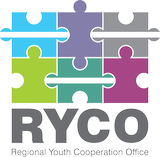Milan attended his first youth exchange programme in the spring of 2018. Milan is not his real name but he is a real person who shared his story. He enjoyed his stay in Sarajevo, where he immersed himself in the topic of dealing with the past and made new friends. He did not get much sleep during this time.
Saying goodbye on the last day was very emotional, with plenty of hugs and tears. The young people promised each other that they would stay in touch via Instagram and that they would meet-up again, perhaps through another youth exchange.
The project did not end on that day for Milan
After a long and exhausting trip back home to a small town in Northern Serbia, the following day he went to ‘his’ local youth centre to talk about what had happened at the meeting in Sarajevo. Guided by a local youth worker, he took the chance to reflect on his experiences with the other participants from his town.
Milan did not want to stop there, because he felt the need to pass on what he had experienced and learned. Together with a youth worker, he developed a peer-to-peer workshop for his school.
At home, even though he knew they would not agree with him on certain issues he talked to his parents. It was still interesting for him to engage in these conversations.
He also spoke to his friends and enjoyed the discussions with those who were interested.
Milan was a very engaged participant and successful multiplier, holding more than twenty workshops at his school.
Obviously, this was not the case with all of the par ticipants. However, many talked to someone, be it their parents, grandparents, teachers, classmates, siblings or friends. They shared their experiences with sports team members and through online networks. Some like 19-year-old Šejla from Sarajevo spoke within their religious communities, which in Šejla’s case involved speaking to people at her local mosque.
Everyone gets to hear a specific story
Our research shows that young people are careful about with whom they share information. Parents are often the first contact the young people have after participating in a project. The information they offer varies from a report on the weather, the food or the hotel to descriptions of what happened at the seminar to profound discussions about the topics they discussed during the youth exchange.
Milan’s new friend Luka, a 19-year old participant, told us why he would like to speak about his youth exchange experience with his grandparents. “I like to talk to them because they are old people, but I don’t see that as a bad thing. They lived their lives in other eras and experienced many things and I think they will enjoy hearing another story.” He expects a fruitful, intergenerational dialogue with his grandparents, bringing in their life experiences and his contribution of new information and the different perspectives he encountered.
Other participants described their grandparents as ‘close minded’ and unwilling to participate in complex or difficult topics. The same was true of some classmates or friends. In order to avoid conflict, some participants might decide to limit their discussions to ‘like-minded’ friends whereas other participants will feel that it is their duty to talk to everyone in their surroundings.
Participants are credible testimonials and multipliers
By sharing their stories about their youth exchange experiences the participants ensure that the impact of the project extends far beyond its original interactions.
The participants talk about peace, intercultural dialogue, human rights and all of the other topics addressed at the many different youth exchanges funded by RYCO. They talk about what they have in common with their peers in the Western Balkans as well as their fears and their hopes for their future. They also talk about their new friends from Albania, Bosnia and Herzegovina, Kosovo*, Montenegro, North Macedonia and Serbia.
They are multipliers because they report first hand experiences and this creates trust. Not everyone they talk to will agree with them or will change their minds because of what they say but the participants’ stories serve as ‘food for thought’ for their listeners.
Participants also are credible testimonials that evoke interest among their peers and motivate them to participate in the dialogue.
The additional value of post project dialogue
Telling others about personal experiences makes you rethink, reframe and adapt what you have learned to cater to different audiences. Additionally, participants may have to handle negative reactions of disinterest and confrontational feedback. Therefore, engaging in these conversations contributes to the participants’ personal development.
Trainers and Organisers share their experiences
Working on youth exchange projects can be challenging, wonderful and overwhelming at the same time. The trainers and organisers can create new experiences through the many stories they share. Like the participants, they too are multipliers through their personal networks. Their families and friends will hear about their stories and the content of the seminar as well as about the time spent with participants from all over the region.
Trainers and organisers also talk to colleagues and their broader professional networks about their work and thus spread the news about RYCO funded youth exchanges. In this sense, they are effective multipliers in both their private and professional lives.
Ripple effects are the reason why the effect of Youth Exchanges extend beyond the direct participants
In their study ‘Ripple Effects and Peacebuilding in Exchange Programs’ the American scientists Julie and Douglas Olberding show that youth exchange projects have the potential to impact others beyond the direct organisers and participants through a ‘ripple effect’.
Interaction with visitors from the region who take part in an exchange programme affects people not considered initially such as hotel or restaurant staff and potentially the entire community of the host location.
These interactions might happen by chance, when the participants explore the host town and interact with vendors, when the hotel staff supports the preparation of the seminar setting or when the local doctor has to be consulted for medical advice. The organisers can also consciously enable these meaningful interactions with locals as part of their youth exchange project by organising public opening and closing ceremonies and by inviting the local community to the theatre performances, film screenings and sports events and so on. In so doing, youth exchanges will have an impact that goes far beyond those directly involved.
Michaela Griesbeck
is a communication scientist and expert in youth studies and intercultural communication. She researches and teaches at the University of Vienna.
Aisha Futura Tüchler
is a cognitive scientist with a solid background in psychology and linguistics. She is a researcher and lecturer at the Sigmund Freud University of Vienna.
This article is a part of the RYCO publication “A Better Region Starts with YOUth” which can be accessed here. The central part of this publication is a scientific research conducted by the team of researchers from the University of Vienna. The research focuses on young people in the Western Balkans and their participation or non-participation in regional youth exchange programs supported by RYCO.
*This designation is without prejudice to positions on status and is in line with UNSCR 1244 and the ICJ Opinion on the Kosovo Declaration of Independence.



